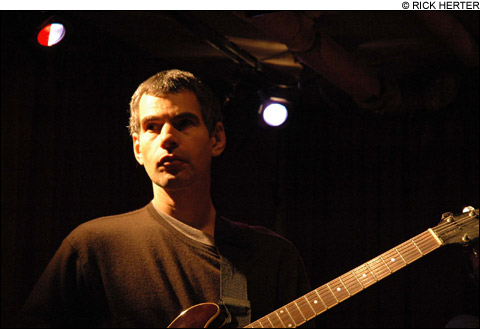
APPLIED SCIENCE; Monder knows a lot — and he knows how to make it beautiful. |
As guitar heroes go — even jazz guitar heroes — Ben Monder flies under the radar. At 48, he comes after the generation of the Big Three — Metheny, Frisell, and Scofield — but before the current Big One, Kurt Rosenwinkel. He's played with everyone from, at the beginning of his career, soul-jazz organist Jack McDuff and funk bands to, more recently, Tim Ries's Rolling Stones Project and a circle of New York heavy cats like Paul Motian, Maria Schneider, Tony Malaby, Chris Cheek, and Bill McHenry. He and saxophonist McHenry play as a duo at Johnny D's next Thursday in support of their recent Sunnyside release, Bloom. Every guitarist in town will be there — and anyone who isn't ought to be, along with jazz and progressive-music fans.
Playing Rolling Stones rock or Maria Schneider orchestral, Monder could easily be pegged as a musical chameleon. But that implies facelessness. Monder is more like a great actor taking various demanding roles. (His previous trip to Boston was with the Mexican jazz singer Magos Herrera at Scullers in April.) What other bandleaders come to him for is not just his fleet fingers but an incisive musicality informed by a vast, fluent vocabulary of harmony and color.
Bloom is one side of Monder's personality — 10 spontaneous improvisations that he recorded with McHenry back in February 2000 on which you can hear the full play of his sonic world. He can stomp on the volume pedal, unleash a chorus of skronk, cast a veil of loops, or hush his strings down to dampened plucks or glycerin-thick reverb that hangs in the air. On "The Shadow Casts Its Object," he begins with murky-pastel long tones before McHenry's tenor enters with a short statement. They take turns "talking" to each other in short passages until Monder suddenly drops down to a deep baritone of hard-struck single notes and the conversation becomes more agitated. Then back to some whispered top notes and fluttering arpeggios against a slowly climbing tenor line before Monder's guitar disappears into the distance with a short ping. This is spontaneous improv at its best, the players responding like two abstract painters working as one, attentive to the shape and texture of each gesture, mark to ground.
Bloom is different from the work Monder does with McHenry's quartet or that of Tony Malaby, where free and composed material interact. And it's way different from Monder's 2005 masterwork Oceana, a quartet record with singer Theo Bleckmann, drummer Ted Poor, and alternating bassists Kermit Driscoll and Skuli Sverrisson. Monder describes Oceana as "90 percent through-composed." The pieces are often dominated by repeated arpeggiating guitar patterns, as in the 16:54 title track. The repetitive short patterns suggest minimalism, except that Monder subjects them to a series of agitated rhythmic and tonal transformations, right on through to a heavy-chorded climax with drums and bass and a break for a gentle, floating wordless vocal from Bleckmann. The album also includes more-"jazz-like" single-note guitar lines, and the hefty jazz-rock workout "Rooms of Light." But what you're likely to take away from it — with its use of space, layered rhythms and harmonies, and ambiguous tonalities — is a sense of brooding mystery.